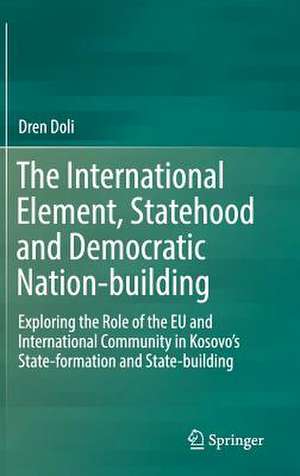The International Element, Statehood and Democratic Nation-building: Exploring the Role of the EU and International Community in Kosovo’s State-formation and State-building
Autor Dren Dolien Limba Engleză Hardback – 28 feb 2019
Although contested, Kosovo, and its quest for statehood, represents a unique example of successful unilateral secession. The book therefore explores and analyses patterns of state formation and nation-building in Kosovo, and its transition to democracy. It presents a three-level assessment. First, seen from a historical perspective, the book examines the validity of the right of Kosovar-Albanians to self-determination and remedial secession. Second, from a legal positivist perspective, it scrutinizes all of the legalist arguments that support Kosovo’s right to statehood, and claims that both traditional and legality-based criteria for statehood remain insufficient to determine whether Kosovo has achieved statehood. Third, from a post-factum perspective, the book analyzes the scope and extent to which the internationally blended element was decisive in Kosovo’s state-formation and state-building processes. It explains how the EU’s involvement as an ‘internationally blended element’ in Kosovo’s efforts to achieve statehood was instrumental and played a crucial role in shaping the emerging state. In particular, the book elaborates on how the EU was able to streamline its mode of intervention in the context of state-building and reform.
Preț: 730.47 lei
Preț vechi: 890.82 lei
-18% Nou
Puncte Express: 1096
Preț estimativ în valută:
139.78€ • 149.47$ • 116.54£
139.78€ • 149.47$ • 116.54£
Carte tipărită la comandă
Livrare economică 17 aprilie-01 mai
Preluare comenzi: 021 569.72.76
Specificații
ISBN-13: 9783030059941
ISBN-10: 3030059944
Pagini: 240
Ilustrații: XIII, 232 p. 49 illus.
Dimensiuni: 155 x 235 mm
Greutate: 0.53 kg
Ediția:1st ed. 2019
Editura: Springer International Publishing
Colecția Springer
Locul publicării:Cham, Switzerland
ISBN-10: 3030059944
Pagini: 240
Ilustrații: XIII, 232 p. 49 illus.
Dimensiuni: 155 x 235 mm
Greutate: 0.53 kg
Ediția:1st ed. 2019
Editura: Springer International Publishing
Colecția Springer
Locul publicării:Cham, Switzerland
Cuprins
Chapter 1. State formation, State-building and International Element,- Chapter 2. History, Identity and Myths. How narratives of the past [are] shape[ing] the present?,- Chapter 3. Legitimacy through missing consensus. Kosovo and the 1244 Resolution, Vienna Negotiations and Ahtisaari Plan: The Starting Point for the ‘International Element,- Chapter 4. International Element, Quest to Statehood and International Law,- Chapter 5. Kosovo´s Quest for Statehood: From Unilateral Secession to Recognition,- Chapter 6. The policy of deliberate ambiguity: Petitioning the role of the EU in Kosovo’s State-formation and State-building,- Chapter 7. Brussels Agreement: Between statehood and 1244 status,- Chapter 8. The EU’s recent engagement with Kosovo through the Special Court project: A case study indicating the EU’s supportive position on the state of Kosovo,- Chapter 9. Concluding on thesignificance of the ‘international element’ in Kosovo’s statehood and state-building process.
Textul de pe ultima copertă
This book represents a unique endeavor to elucidate the story of Kosovo’s unilateral quest for statehood. It is an inquiry into the international legal aspects and processes that shaped and surrounded the creation of the state of Kosovo. Being created outside the post-colonial context, Kosovo offers a unique yet controversial example of state emergence both in the theory and practice of creation of states. Accordingly, the book investigates the legal pathways, strategies, developments and policy positions of international agencies/actors and regional players (in particular the EU) that helped Kosovo to establish its independence and gradually acquire statehood.
Although contested, Kosovo, and its quest for statehood, represents a unique example of successful unilateral secession. The book therefore explores and analyses patterns of state formation and nation-building in Kosovo, and its transition to democracy. It presents a three-level assessment. First, seen from a historical perspective, the book examines the validity of the right of Kosovar-Albanians to self-determination and remedial secession. Second, from a legal positivist perspective, it scrutinizes all of the legalist arguments that support Kosovo’s right to statehood, and claims that both traditional and legality-based criteria for statehood remain insufficient to determine whether Kosovo has achieved statehood. Third, from a post-factum perspective, the book analyzes the scope and extent to which the internationally blended element was decisive in Kosovo’s state-formation and state-building processes. It explains how the EU’s involvement as an ‘internationally blended element’ in Kosovo’s efforts to achieve statehood was instrumental and played a crucial role in shaping the emerging state. In particular, the book elaborates on how the EU was able to streamline its mode of intervention in the context of state-building and reform.
Caracteristici
Provides an in-depth mapping of the challenges arising from disputed statehood and unilateral secessionist claims Highlights how complicit elements of ‘multilateral international involvement’ and ‘constitutive recognitions’ remain inherently present in modern state emergence and state-building processes Demonstrates how democratization as a non-orthodox statehood criterion is steadily gaining new momentum and is demonstrated par-excellence in the case of Kosovo Explains how the EU was able to streamline its mode of intervention in the context of state-building and reform
